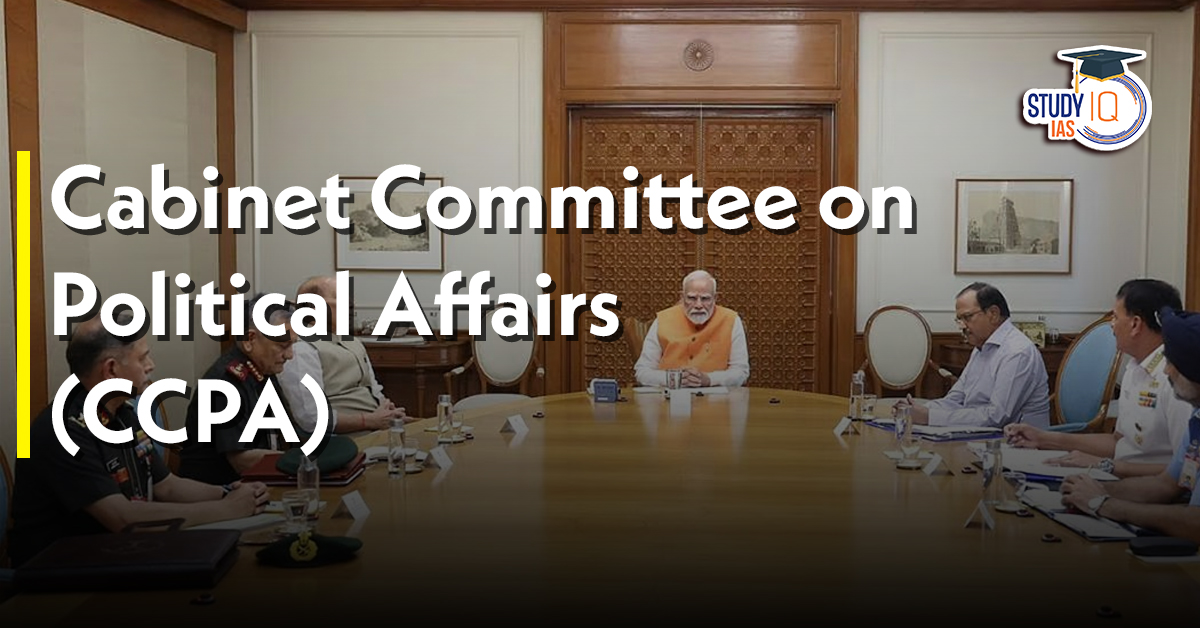Table of Contents
The Cabinet Committee on Political Affairs (CCPA), often dubbed as the “Super Cabinet”, is one of the most powerful decision-making bodies within the Government of India. It plays a crucial role in handling policy issues, Centre-state relations, internal security, and foreign affairs with significant political implications. Chaired by the Prime Minister, the CCPA becomes especially active during times of national crises, terror attacks, and major political developments.
This article explores the composition, functions, significance, and recent developments related to the CCPA, with a special focus on its relevance after the Pahalgam terror attack (April 2025).
What is the Cabinet Committee on Political Affairs (CCPA)?
The CCPA is one of the eight Cabinet Committees established under the Transaction of Business Rules, 1961, which derive authority from Article 77 of the Indian Constitution. The CCPA is known for addressing key political issues and for shaping India’s internal and external strategic direction.
Composition of CCPA (As of 2025)
The Prime Minister of India chairs the CCPA. The current composition (April 2025) includes the following Union Ministers:
| Name | Portfolio |
|---|---|
| Narendra Modi | Prime Minister (Chairperson) |
| Rajnath Singh | Defence Minister |
| Amit Shah | Home Minister |
| Nirmala Sitharaman | Finance Minister |
| Piyush Goyal | Commerce and Industry Minister |
| Nitin Gadkari | Road Transport Minister |
| JP Nadda | Health Minister |
| Kiren Rijiju | Parliamentary Affairs Minister |
| Bhupender Yadav | Environment Minister |
| Sarbananda Sonowal | Shipping Minister |
| K Ram Mohan Naidu | Civil Aviation Minister |
| Jitan Ram Manjhi | MSME Minister |
| Annapurna Devi | Women and Child Development Minister |
| G. Kishan Reddy | Coal Minister |
Additionally, ministers from allied political parties are also included in the committee for broader consensus-building.
Key Functions of the CCPA
The Cabinet Committee on Political Affairs is tasked with the following responsibilities:
1. Centre-State Relations
-
Handles sensitive issues related to Centre-State coordination.
-
Facilitates consensus-building with state governments on federal issues.
2. Political Affairs
-
Reviews and strategizes on issues with major political implications.
-
Takes decisions on alliances, election preparedness, and parliamentary management.
3. Internal Security and Law & Order
-
Plays a key role during terror attacks, insurgencies, or civil unrest.
-
Coordinates with the Ministry of Home Affairs and security agencies.
4. Economic and Foreign Policy Decisions
-
Reviews economic policies that may have political consequences.
-
Advises on foreign policy moves that impact India’s strategic interests.
5. Inter-Ministerial Coordination
-
Ensures coordination among ministries on cross-cutting issues.
-
Helps align policy execution with broader government priorities.
Why is the CCPA Called the ‘Super Cabinet’?
The CCPA is termed the “Super Cabinet” because:
-
It comprises top-tier ministers from key ministries.
-
It is often the final decision-making authority on critical political and strategic matters.
-
It meets during national emergencies or important international developments.
CCPA & National Security: Pulwama to Pahalgam
2019: Pulwama Attack
-
The CCPA met after the Pulwama terror attack that killed 40 CRPF personnel.
-
It recommended the withdrawal of MFN status to Pakistan and endorsed the Balakot airstrikes.
2025: Pahalgam Attack
-
After the April 22, 2025, terror attack in Pahalgam (26 killed), the CCPA was reconvened.
-
It followed a CCS (Cabinet Committee on Security) meeting where PM Modi granted complete operational freedom to armed forces.
-
The CCPA may lead to military, diplomatic, and economic countermeasures against Pakistan.
Recent CCPA Decisions (April 2025)
-
Review of India-Pakistan relations
-
Indus Waters Treaty freeze
-
Closure of Attari border
-
Cancellation of Pakistani visas
-
Coordination with the Defence and Home Ministries on national security
These decisions reflect the aggressive diplomatic and strategic posture adopted by India post-Pahalgam.
Importance of the CCPA in Indian Governance
-
Crisis Management: Acts swiftly during terrorist attacks, wars, pandemics, or national unrest.
-
Strategic Oversight: Balances security, economy, and foreign relations.
-
Political Steering: Guides major political actions, especially in coalition scenarios.
-
Policy Coherence: Aligns cabinet-level policymaking with national interests.
Conclusion
The Cabinet Committee on Political Affairs (CCPA) remains a cornerstone of India’s governance and strategic planning framework. From Pulwama to Pahalgam, it has played a defining role in shaping India’s internal security policies, political strategies, and foreign relations. As India continues to face complex challenges, the role of the CCPA as the “Super Cabinet” will only grow in importance.


 World Day of Social Justice 2026: Theme,...
World Day of Social Justice 2026: Theme,...
 NHAI to Develop India’s First Bee Corr...
NHAI to Develop India’s First Bee Corr...
 Loggerhead Turtles – Ecology, Habitat,...
Loggerhead Turtles – Ecology, Habitat,...




















